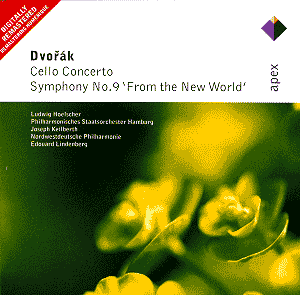The 1963 edition
of EMG’s “The Art of Record Buying” (of blessed memory) listed
four two-star versions (their maximum) of the Dvořák Cello
concerto: Rostropovich/Boult, Fournier/Kubelík (a
1955 mono Decca still selling at full price), Fournier/Szell and
the present Hoelscher/Keilberth (then on Telefunken). The first
of these has rarely been out of the catalogue and some feel it
reaches the highest point of Rostropovich’s interpretation of
this concerto. Not so long afterwards he made a version with Karajan
which set standards of expressive indulgence which have been all
too frequently matched since, not least by himself. The Fournier
versions are less well-remembered though the cellist himself has
certainly never been forgotten. But what of Hoelscher and Keilberth?
The recording still comes up well for its age,
with plenty of presence from the cellist but rather backward placing
of the orchestra. This touches on the absurd in the finale where
the cello duets with a solo violin who sounds to be at the other
end of a long corridor, but otherwise I was not unduly concerned
and nothing important is actually inaudible.
Fears that Keilberth might prove too stodgily
Teutonic for Dvořák are happily
unfounded. Remember that his Rusalka from the early post-war years
has recently been reissued, so he must have had a wider knowledge
of this composer than virtually any of his German contemporaries.
Though classically inclined (like Boult for Rostropovich)
he conducts with affection and a real sense of colour.
Hoelscher is clearly of the same idea, allying
a strong technical command with an approach which respects the
letter of the score and yet expresses it with nobility, passion
and warm musicianship. This reminded me of the Janigro/Dixon Westminster
recording by which I got to know the work, and which I would dearly
love to hear again. The concerto is here made to sound the masterpiece
it is. I wish I could tell you something about Ludwig Hoelscher,
but the booklet repeats its by-now familiar résumé
of Lindenberg’s career without a mention of either Hoelscher or
Keilberth.
This "New World" joins the reissues
of Beethoven (5 and 7) and Brahms (3 and 4) under the baton of
the Romanian naturalised French conductor Edouard Lindenberg.
It is evident from the opening bars that this is going to be a
dramatic interpretation, and the (repeatless) first movement has
a lot of energy while managing to relax for the more lyrical themes
without slackening the tempo. The orchestral playing is rather
rough and ready and I don’t think I’ve ever heard the opening
chords of the second movement so poorly played on record, either
as ensemble or for intonation. Lindenberg also doesn’t seem to
have decided what tempo he wants until several bars in. When it
settles down it proves to be a broad tempo with much lovely phrasing
if not quite the rapt, detailed response to be found on Nikolai
Malko’s incredibly beautiful Danish recording.
A Lindenberg disc
often seems to yield at least one movement which challenges our
preconceptions, and here it is the scherzo, where he has noticed
that Dvořák’s metronome marking is slower than we usually
hear. The accustomed wild west gallop is replaced by menacing
outer sections and a lolloping, sousedská-style
trio. Interesting, but compromised by the scrappy playing, as
is the finale where a broad tempo is not carried off with the
continuity of either of Malko’s versions. But what lovely phrasing
he suddenly gets during the sublime clarinet melody. However,
of the three Lindenberg reissues I have now dealt with the Beethoven
coupling remains that which best supports his claim to be remembered.
Since the recording is no more than fair I don’t
think this can rank high among New
Worlds. Anyone who snaps the disc up as a cheap way of acquiring
Dvořák’s most popular (and best) concerto together with his
most popular (but probably not his best) symphony will get a good
enough idea of the latter, but they could do so much better
in all price ranges. Collectors of vintage performances will be
glad to have the cello concerto and they will perhaps wonder if,
in view of the fact that Keilberth’s Telefunken recordings included
a New World, an opportunity has not been lost.
Christopher Howell
